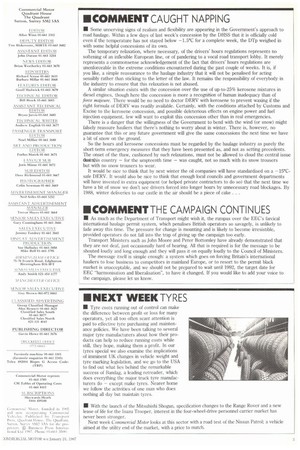• COMMENT CAUGHT NAPPING
Page 5

If you've noticed an error in this article please click here to report it so we can fix it.
• Some unnerving signs of realism and flexibility are appearing in the Government's approach to road haulage. Within a few days of last week's concession by the DHSS that it is officially cold even if the temperature has not stayed below —1.5°C for a complete week, the DTp weighed in with some helpful concessions of its own.
The temporary relaxation, where necessary, of the drivers' hours regulations represents no softening of an inflexible European line, or of pandering to a vocal road transport lobby. It merely represents a commonsense acknowledgement of the fact that drivers' hours regulations are unenforceable in the extreme conditions encountered during the past couple of weeks. It is, if you like, a simple reassurance to the haulage industry that it will not be penalised for acting sensibly rather than sticking to the letter of the law. It remains the responsibility of everybody in the industry to ensure that this relaxation is not abused.
A similar situation exists with the concession over the use of up-to-25% kerosene mixtures in diesel engines, though here the concession is more a recognition of human inadequacy than of force majeure. There would be no need to doctor DERV with kerosene to prevent waxing if the right formula of DERV was readily available. Certainly, with the conditions attached by Customs and Excise to the kerosene concession, and possible deleterious effects on engine power and fuel injection equipment, few will want to exploit this concession other than in real emergencies.
There is a danger that the willingness of the Government to bend with the wind (or snow) might falsely reassure hauliers that there's nothing to worry about in winter. There is, however, no guarantee that this or any future government will give the same concessions the next time we have a bit of snow on the ground.
So the hours and kerosene concessions must be regarded by the haulage industry as purely the short-term emergency measures that they have been presented as, and not as setting precedents. The onset of the thaw, cushioned by such relaxations, must not be allowed to cloud the central issue tkatithis country — for the umpteenth time — was caught, not so much with its snow trousers but with no snow trousers to wear.
It would be nice to think that by next winter the oil companies will have standardised on a —155Csafe DERV. It would also be nice to think that enough local councils and government departments will have invested in extra equipment (or helped private contractors to do so) that the next time we have a bit of snow we don't see drivers forced into longer hours by unnecessary road blockages. By 1988, winter deliveries to our castle in the air should be a piece of cake .








































































































